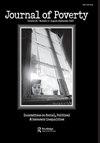埃塞俄比亚家庭贫困的决定因素
IF 0.8
Q3 SOCIAL WORK
引用次数: 1
摘要
摘要本研究的目的是调查埃塞俄比亚家庭贫困的决定因素。该研究使用了世界银行在2014年第二阶段收集的全国调查数据。该研究采用二元逻辑回归模型来确定家庭贫困的决定因素。结果表明,户主的教育水平、家庭规模、抚养比、家庭居住地、家庭所在地区、非农企业所有权(建设)、家庭经济状况(高)、创业企业来源(信贷和储蓄机构)、,以及缺乏支持机构是影响家庭贫困概率的因素。本文章由计算机程序翻译,如有差异,请以英文原文为准。
Determinants of Household Poverty in Ethiopia
ABSTRACT The purpose of this study is to investigate the determinants of household poverty in Ethiopia. The study used the national survey data collected by the World Bank during the second phase in 2014. The study employed a binary logistic regression model to identify the determinants of household poverty. Results show that educational level of the household head, family size, dependency ratio, residence of the household, the region in which the household resides, ownership of non-farm enterprises (construction), economic status of the household (high), source of start-up enterprises (credit and saving institutions), and lack of supporting institutions were the factors affecting the probability that a household is poor.
求助全文
通过发布文献求助,成功后即可免费获取论文全文。
去求助
来源期刊

Journal of Poverty
SOCIAL WORK-
CiteScore
2.60
自引率
10.00%
发文量
26
期刊介绍:
The Journal of Poverty is the first refereed journal to recognize the inequalities in our social, political, and economic structures, presenting progressing strategies that expand society"s increasingly narrow notions of poverty and inequality. The journal"s broad understanding of poverty—more inclusive than the traditional view—keeps the focus on people"s need for education, employment, safe and affordable housing, nutrition, and adequate medical care, and on interventions that range from direct practice to community organization to social policy analysis. The journal"s articles will increase your knowledge and awareness of oppressive forces such as racism, sexism, classism, and homophobia that contribute to the maintenance of poverty and inequality.
 求助内容:
求助内容: 应助结果提醒方式:
应助结果提醒方式:


